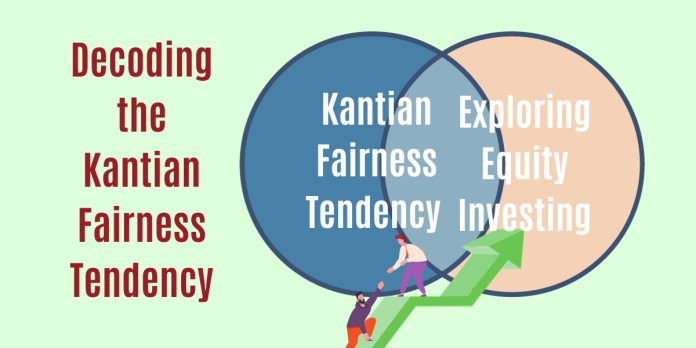In the dynamic landscape of finance, where decisions often hinge on intricate biases and mental frameworks, one principle stands out as both a guide and a beacon—the “Kantian Fairness Tendency.” Named after the venerable philosopher Immanuel Kant, this cognitive compass is not just a philosophical musing; it’s a game-changer in the world of equity investing. Join us as we unravel the threads of fairness woven into the financial fabric by this intriguing mental model.
Kantian Fairness Tendency: A Finance Maverick’s Map to Morality
Immersed in Charlie Munger’s 25 Cognitive Biases, the Kantian Fairness Tendency isn’t just a lofty ideal; it’s the moral underpinning of our financial decisions. Grounded in Kant’s categorical imperative, it demands that an action be universally applicable without contradiction to be deemed morally right. This isn’t just about fairness; it’s about the delicate dance between reciprocity, trust, and autonomy.
As we dive into the realm of finance, it’s clear that the Kantian Fairness Tendency isn’t confined to personal choices; it’s the unseen force shaping collective behaviors, molding societal norms, and even influencing legal structures.
Financial Narratives: Stories of Fairness and Its Breach
Academic Equity:
Picture a university group project as a microcosm of financial dynamics. Harmony reigns when everyone contributes equally, but a freeloader disrupts the balance, illustrating how the Kantian Fairness Tendency permeates even the smallest group dynamics.
The 2008 Financial Odyssey:
Zoom out to the macro scale—the 2008 financial crisis. Critics argue it was a blatant violation of the Kantian Fairness Tendency, as institutions pursued self-interest, triggering an economic collapse. The aftermath birthed reforms, a stark reminder that fairness is not just a moral compass but a regulatory necessity.
Legal Structures and Finance:
Kant’s principles echo through the corridors of justice. Democratic societies embody his fairness ethos in the criminal justice system, asserting equality before the law regardless of social or economic standing.
Kantian Fairness Tendency in Equity Investing: Redefining the Game
In the financial arena, the Kantian Fairness Tendency isn’t just a moral code; it’s a transformative force reshaping investment strategies.
Investor Magnets:
Companies embracing fairness, transparency, and corporate responsibility become investor magnets. Those veering towards unethical practices risk investor trust and market valuation.
Portfolio Harmony:
Investors guided by the Kantian Fairness Tendency seek a balanced portfolio that ensures not only personal gains but also fair treatment of stakeholders. It’s a strategic dance for sustainable growth.
Boardroom Justice:
Treating everyone as an end in itself influences corporate governance. Boards strive for fair treatment, impacting investor perceptions and equity pricing through transparent communication and equitable dividends.
Regulatory Virtue:
Firms committed to fairness view regulations as tools for ensuring fair practices, earning positive nods from investors and potentially higher stock valuations.
Read: Understanding Stock Value: A Deep Dive Into Key Investor Metrics
Ethical Investing:
In the era of ESG investing, the Kantian Fairness Tendency guides choices that balance profit-making with societal good. A company’s commitment to fairness influences its stock performance in the socially conscious market.
Closing the Deal: The Everlasting Echo of Fairness
Understanding the Kantian Fairness Tendency unravels the finance code, revealing the drive for fairness shaping decisions. It’s a collective responsibility to respect autonomy, echoing Martin Luther King Jr.’s words, “Injustice anywhere is a threat to justice everywhere.”
While fairness may not guarantee immediate profit, it’s the bedrock for maintaining order, fostering respect, and building a just financial society. The Kantian Fairness Tendency, a timeless beacon, resonates in our modern financial world, reminding us of the intrinsic worth of every transaction and the paramount importance of treating others with dignity and respect.


